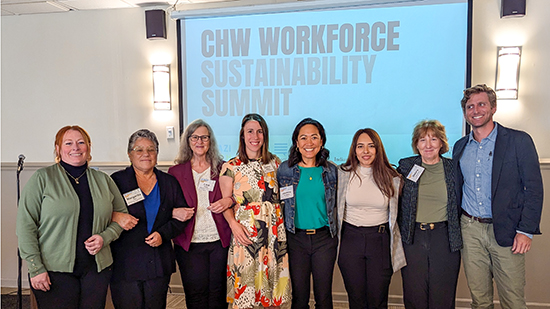Debra Litzelman, MD, director of education for the IU Center for Global Health Equity (IUCGHE), and Michael Scanlon health policy scholar for IUCGHE, participated in the inaugural 2024 Community Health Worker (CHW) Sustainability Summit on September 13.
The summit was organized by the CHW Reimbursement Taskforce, a multidisciplinary group that was established in 2023 to champion community health workers as vital members of Indiana’s health workforce through advocacy, knowledge-sharing and strategic partnerships. The summit brought together over 70 individuals from academic institutions, health systems, state and county health departments and community-based organizations in Indiana, as well as representatives from the nationwide IMPaCT organization and the CHW Collaborative of South Dakota, to learn about sustainable models for community health workers through presentations, break out discussions and networking.
CHWs are a vital and internationally recognized cadre of the health workforce, but in many settings including the U.S. there is a lack of sustainable funding to support this workforce. CHWs are trusted liaisons to the communities in which they serve and provide health education, social support, care linkage and coordination, and advocacy.
After witnessing the impact of CHWs in Kenya through her work at AMPATH, Dr. Litzelman created the WeCare program in 2016 that employs CHW “coaches” to support pregnant and parenting women by providing health education and linking them to health and social services. “CHWs have been an evidence-based member of the health workforce around the world for decades,” Dr. Litzelman said. “What we desperately need to scale up these models of care is sustainable funding. Like WeCare, most CHW programs rely on grant funds that jeopardize the long-term sustainability of these vital services.”
At the summit, Dr. Litzelman and Scanlon led a presentation entitled “Policy Landscape and Financing Models for Community Health Workers.” The session included an analysis of state policies and approaches to finance CHWs with a focus on reimbursement through Medicaid and Medicare and findings from key informant interviews with leaders of CHW programs in Indiana.
“This is an exciting time as states are piloting and implementing different approaches to reimbursement,” Scanlon said. Indiana was one of the first states to allow reimbursement for CHW services through Medicaid in 2018, but few programs have taken advantage of this due to challenges with billing and low reimbursement rates.
“Indiana has an opportunity to be a leader in this area and we are hopeful that the summit represents an important step in this direction,” Scanlon added. The session led by Dr. Litzelman and Scanlon is part of a larger project that included a statewide survey of CHWs, key informant interviews and comparative policy analysis. The project is supported by the Indiana Department of Health.



